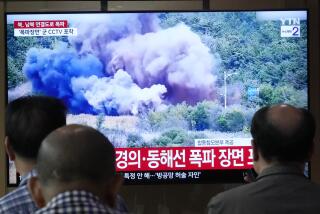China unveils high-speed rail line to North Korean border
- Share via
Reporting from Beijing — China opened a new high-speed rail line to the North Korean border Tuesday as Chinese officials inch ahead with plans to encourage trade with their erratic neighbor.
But some analysts see the new route more as a reflection of China’s infrastructure-building programs and a demonstration of Beijing’s “soft power” in the region rather than an expectation of an immediate, large surge in tourism and trade with its hermetic neighbor.
The 129-mile route between Shenyang city in the northeast and the Chinese border city of Dandong will allow train travel at up to 156 mph and cut the journey from 3 1/2 hours to 60 minutes, the official New China News Agency said in announcing the line’s trial opening. Dandong is the key hub for trade and tourism between North Korea and China; more than 600 border trade enterprises are situated in Dandong and trade with North Korea accounts for 40% of the city’s total trade volume.
China is the main trading partner of North Korea and has taken the regional lead in seeking to curb its neighbor’s nuclear intentions. But the Pyongyang government’s renegade weapons development in recent years and its threats to attack perceived enemies have strained relations with Beijing and slowed the progress of efforts to build up special economic zones intended to pair North Korea’s cheap labor with Chinese capital and technological know-how.
Nevertheless, China announced last week that it was preparing to open a border trade zone in Dandong. The Guomenwan trade zone is to open in October during the North Korea-China Economic, Trade, Culture and Tourism Expo, the Liaoning provincial government said.
The zone was built at a cost of $156 million and covers about 240,000 square feet. Chinese residents living within 12 miles of the border will be allowed to exchange commodities at the zone with North Koreans and no taxes will be levied on purchases of about $1,250 or less a day.
There have been tensions and uncertainty in the nearly four years since the unpredictable Kim Jong Un took power after the death of his father, Kim Jong Il, in December 2011. The younger Kim has at times suspended cooperation with the foreign-financed joint venture parks along the Chinese and South Korean borders in protest of criticism from Beijing and Seoul over North Korea’s violation of international nuclear nonproliferation agreements.
China has been laying high-speed rail across Asia for the last decade and the new Shenyang-Dandong line is a relatively small and remote stretch of the grand plan for a vibrant new Silk Road across the continent, said Scott Kennedy, director of the Center for Strategic and International Studies’ project on Chinese business and political economy.
“This is not that big a deal, economically. It may actually help the city of Shenyang more than it helps Chinese-North Korean relations,” Kennedy said.
He called Shenyang a Rust Belt capital beset with large and inefficient state-owned heavy industries in a region mired in debt and recession. The rail line construction that began in 2010 probably provided much-needed jobs in the region, Kennedy said.
NEWSLETTER: Get the day’s top headlines from Times Editor Davan Maharaj >>
Although the special economic zones China has created in North Korea have failed to take off under Pyongyang’s reform-resistant leadership, the link could eventually prove important to overall connectivity in the region, Kennedy said.
“China is doing what the United States did in the 1950s, on an equally grandiose scale, in building roadways, rail and airports to connect the country internally and with countries around it,” he said.
The new Shenyang-Dandong line is more an expression of good intention to expand investment in infrastructure throughout the Asia-Pacific region and beyond than a reflection of the prospect for increased economic collaboration with Pyongyang, said Wei Liang, a professor of international relations and trade at the Middlebury Institute of International Studies in Monterey.
“Overall expansion of Chinese overseas investment is the end goal. In North Korea, the leader and the policies are very full of uncertainty, especially in its interaction with China over the past decade,” Wei said. “Policies can change overnight, so investments are very risky for Chinese companies, especially private companies.”
North Korea is highly dependent on trade with China, which accounts for 80% of the reclusive nation’s trade volume, Wei said. Last year Pyongyang’s exchange of goods with China amounted to $6.86 billion — $4.02 billion in imports and $2.84 billion delivered to Beijing, Wei said.
“I think the Chinese government increasingly feels like North Korea is more of a liability than an opportunity,” she said. “Especially within the context of significantly improving relations between South Korea and China.”
Russia last year announced several collaborative projects with Pyongyang, including a rail line from the southern port of Khasan to North Korea’s Rason terminal. Moscow also wrote off most of North Korea’s $11-billion debt in 2012.
But China has been the most steadfast in keeping the door open to mutually advantageous economic projects with North Korea, apparently in hopes of curbing Pyongyang’s nuclear developments by providing jobs and incentive for the kind of sweeping economic reforms necessary to transform the country into a state that can feed and provide for its 24 million people.
Makinen reported from Beijing and Williams from Los Angeles.
ALSO:
Myanmar’s backsliding leads to doubt about U.S. diplomacy strategy
Stock market chaos raises doubts about China’s state-shackled economy
Hong Kong student leaders on charges: We’ll ‘use trial to spread our message’
More to Read
Sign up for Essential California
The most important California stories and recommendations in your inbox every morning.
You may occasionally receive promotional content from the Los Angeles Times.












